Filipina-American Loida Lewis shares her inspiring journey as an Asian-American wife, mother, philantropist, author, and CEO of a billion dollar empire in the U.S.
A well-rested and smiling Loida Nicolas Lewis warmly welcomes me and our photographer Dionam Basco to the private balcony of her suite room in the chic Hotel Market. Accompanied by her neice, Lora Nicolas Olaes, Loida is in Barcelona as part of her European tour to promote her book, Why should guys have all the fun?
Garbed in a colorful printed blouse and black pants, the Filipina philanthropist, entrepreneur and civic leader candidly intimates that she has stopped eating rice since she turned 60 except for when she eats adobo.
Loida was born in Sorsogon, a place she believes is ideal for raising children. Being the first girl after two older brothers, she was her father´s apple of his eye. “I think, when your parents let you do whatever you want and whatever you intend to be, that makes you confident, competitive and ambitious.”
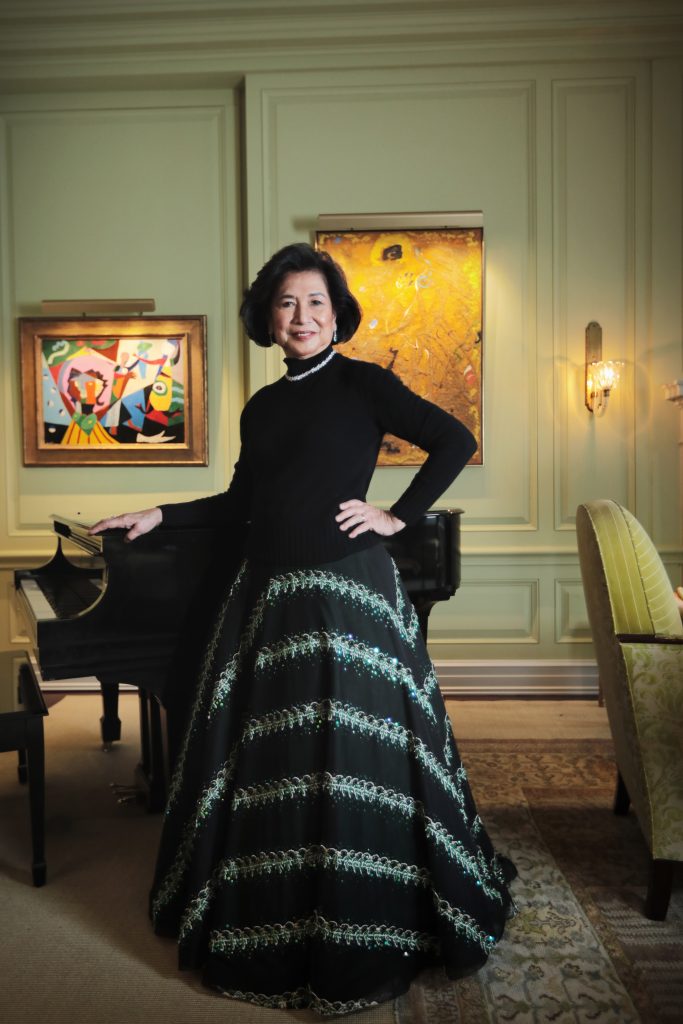
Her father’s entrepreneurial successes, including construction, furniture, entertainment, and agriculture, provided her family with a comfortable lifestyle.“He was fatherless at 12 and lived with a wealthy uncle in Camarines Norte. His uncle’s entrepreneurial spirit deeply influenced him to work hard, believing that he, too, would be successful one day. My father taught us never to distinguish people based on their social class or color,” says Loida proudly.
Some people assume that I feel superior because of my husband’s wealth. I don’t see myself as better than anyone else, and I reject any notion of superiority. It is wrong to treat other people na mataas ako sa iyo, mababa ka sa akin.
Loida Lewis
Academics were Loida´s battleground where she performed exceptionally well, making her father see her as a future big shot lawyer and politician. “He built a cinema and named it after me believing that I would already have name recognition in case I ran for public office,” recalls Loida with a giggle. She graduated salutatorian in elementary school, valedictorian in high school and cum laude at the University of the Philippines.
She once dreamt of becoming a nun, envisioning herself as a lawyer who could serve others and still dedicate her life to God. “But my mother advised me to take the bar exam first and later continue serving others as a nun.”
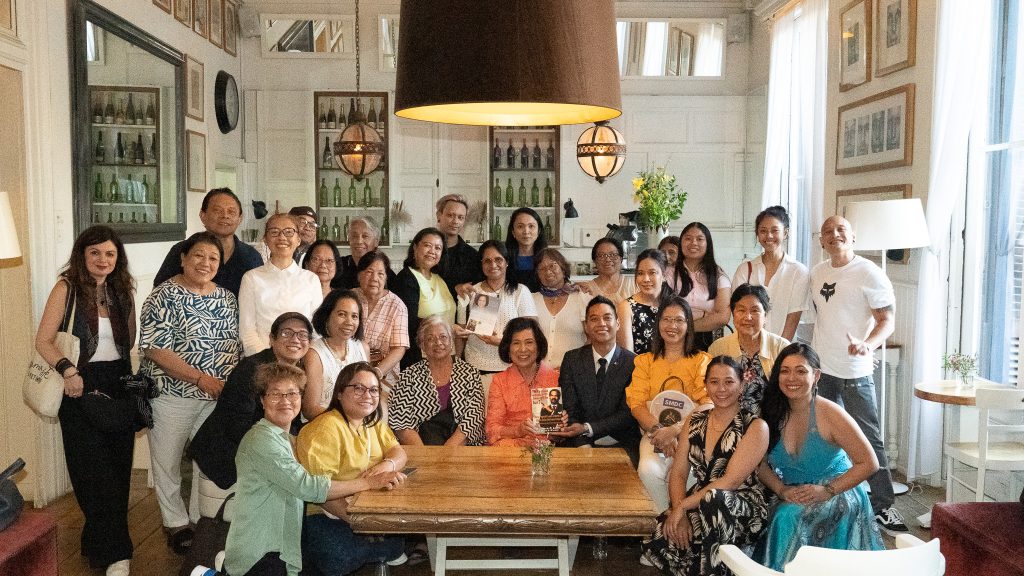
When she passed the bar, her father rewarded her with a trip abroad. The idea of exploring the globe felt like the perfect break before settling into her professional life. In September 1968, she and her mother set off to see the world. After travelling around America, they decided to stop over in New York to spend more time with her sister Imelda who was studying in Columbia University at that time.
An interracial love story
One day, she saw an ad for an administrative assistant at the Civil Rights Research Council. She applied and got the job. Through her boss, she met Mr. Reginald Lewis on a blind date, fell in love, got married in the Philippines in 1969, and had two beautiful children, Leslie and Christina.
Loida´s parents accepted her decision, seeing how in love their daughter was and knowing well that being flighty was never her trait. Loida and Reginald´s union happened just two years after the landmark 1967 Supreme Court case, Loving vs. Virginia, which ruled that laws banning interracial marriage violate the Equal Protection and Due Process Clauses of the Fourteenth Amendment to the U.S. Constitution.
The first year of married life saw Loida dealing with her husband´s temper. As a person of color, Mr. Lewis experienced significant racism and discrimination. And this affected his behavior at home that even a simple comment from his wife could lead to outbursts and harsh words. “Feeling frustrated, I reached out to his mother Carolyn Fugett, with whom I had a close relationship. She told me. ´Why don´t you go to the toilet, spit in it and flush it.´ So I did, and I felt better. Later, I realized that he was out there fighting battles every day, and I needed to be his oasis, his support system, confidant, an adviser, and not another source of stress.”
Fighting discrimination
Loida didn’t want to be just a wife but also a career woman. She worked as a paralegal at a Manhattan legal services firm dedicated to assisting the poor in East Harlem. Although she wasn’t yet eligible for U.S. citizenship, her decision to become a lawyer was clear. And as luck was on her side, in 1973, the US Supreme Court, through the Rights of Aliens ruled that citizenship as a requirement for admission to the bar is a violation of equal protection. Loida could take the bar exam even without attending a US law school.

Preparing rigorously for the bar meant sending her 13-month-old daughter Leslie to her mother-in-law in Baltimore. Mr. Lewis agreed to take over the household responsibilities. “For three months, I devoted 10 to 12 hours daily to studying and practicing my handwriting meticulously. I was focused on taking it just one time.” Loida passed the bar making her the first Asian to do so. “You see, luck is preparation and timing. Once an opportunity arrises and you aren´t prepared, you won´t get it.”
Now a US-certified lawyer, she applied at the US Immigration and Naturalisation Service (now CIS).“There were 11 positions available and I was sure I was going to get it. After a year, I received a letter stating, ´Sorry, you are not accepted,´ with no explanation despite my qualifications.” Believing the rejection was based on race, national origin, and gender, Loida decided to sue for discrimination.
The process took two years. On the third year, the judge directed Immigration to produce the FS171 forms of all those accepted to the post. Six months later and no action from Immigration, he ruled that Loida had been discriminated against; ordering Immigration to hire her and give her three years of back pay. She would work as a general attorney for ten years. “If I had simply given up and accepted the rejection, I would never have known my true worth.”
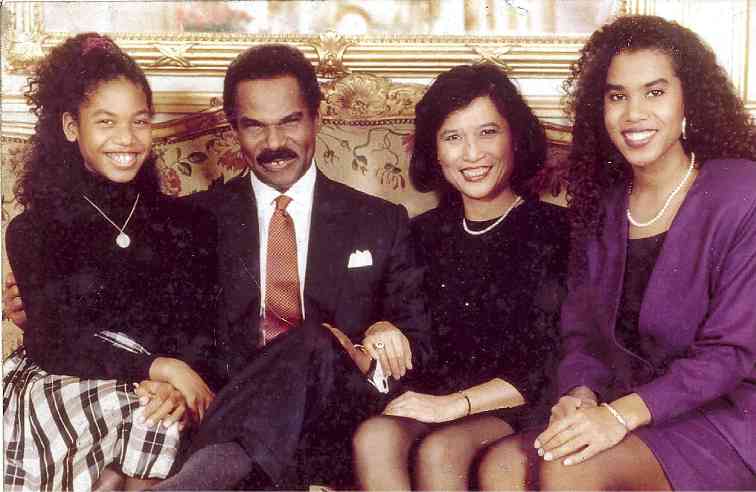
Billionaire´s wife
Mr. Lewis had always aspired to become the richest black man in America by taking over businesses. He knew that to create wealth, he should focus on mergers and acquisitions. Research shows that 90% of startups fail within five years, so instead of starting a new business, it’s often more profitable to buy an existing one, improve it, and increase its profitability.
After three unsuccessful attempts, he realized he needed to hire an accounting firm, an investment firm and his law firm to successfully close deals. And it worked. After his first successful buy-out, he made his biggest bid in 1987 for the TLC Beatrice International foods, a multi-national food conglomerate with operations all across Europe, for $985 million.
Loida had to deal with the massive changes in their lives. Her husband had purchased a jet, a grand Georgian vacation house with 27 rooms, and hired a housekeeper, a driver, and a chef. For a time, they had to relocate to Paris while Mr. Lewis traveled between Europe and the US to oversee his companies. “I decided to quit my job and write a book entitled How to Get a Green Card. We resided in the 7th arrondissement, near the Palais Bourbon, enjoying the life of the rich and famous. Initially, it was intimidating. But it was fun.”

Mr. Lewis saw how engrossed Loida was in her writing that with a hint of feigned jealousy, he told her he also wanted to write his autobiography and would call it Why Should White Guys Have All the Fun? ´As a child, Mr. Lewis always had this nagging question: Why were black people often relegated to low-status jobs and poor living conditions. ¨Why should white guys have all the fun?´ He once asked his grandma.
From Mrs. to CEO
In 1994, tragedy befell the Lewis family. Mr. Lewis passed after a battle with cancer. TLC Beatrice lost its leader during one of the worst recessions in Europe. The company´s income plummeted bankruptcy loomed on the horizon. They needed a strong CEO to steer them through the storm. Loida and her team interviewed five white men for the job, “But when I asked if they could guarantee success, their responses were tentative. They’ll try their best, they said. But what if they failed? Who would bear the responsibility then?”
Loida made a bold decision by taking over as CEO herself. She leveraged their majority ownership of 51% to secure her position and took full responsibility for the company´s future. Under her leadership, the company reduced its expenses and liabilities, sold underperforming assets, and increased its revenue turning it into a 2.2 billion-dollar corporation. In 2002, she guided the company´s liquidation with a 35% internal rate of returns to its investors.
Mr. Lewis didn´t dream of building an empire, but to secure intergenerational wealth. In American society, true intergenerational wealth is rare, particularly for people like us.
Loida Lewis
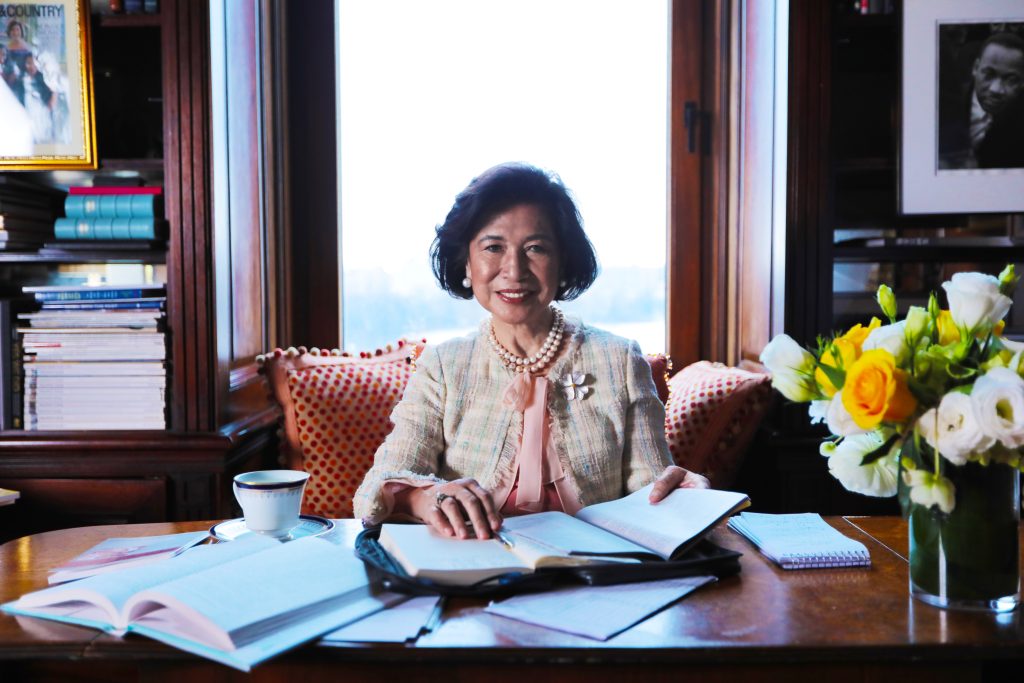
Her reputation as a no-nonsense and feisty Asian-American woman CEO landed her on the cover of the Working Woman Magazine in 1995 and numerous write-ups in reputable business magazines and features on TV shows. The National Foundation for Women Business Owners named her top US business executive.
Because of Mr. Lewis´s untimely death, he never had the chance to finish his book. But Loida wanted the world to know Mr. Lewis´s story, she sought Blair Walker´s service to finish it. Why should white guys have all the fun became a bestseller in Business Week.
But It was Washington Post publisher Katherine Graham´s autobiography that inspired Loida to write her own. She had just turned 60 and promised herself that at 75, she would have published her autobiography. But it took years for her to seek Blair Walker again to co-write the book with her.
Originally titled From Mrs. to CEO, Loida thought that by adapting her husband´s Why Should White Guys Have All the Fun? but giving it a different twist would make it more interesting especially to women. Why Should Guys Have All the Fun? does not only narrate her marriage and becoming the CEO, it also encourages minority businesses to develop a track record of profitability and addresses the gender disparity in the U.S., where women are often paid less and fewer achieve CEO positions. “We are lucky in the Philippines, we are considered as one of the top countries that allow women to be CEOs. In the US, it is a long way to go.” The book was released in 2023 when she turned 80. It became number one on Amazon New Releases for 8 weeks in Business and Finance.
Anything but frail and feeble
When Loida was five, she already knew how to stand up to the world’s taunts simply for being a girl. She recounts a daring episode from her childhood. Her brothers and their friends, perhaps not expecting her to take the bait, dared her to do something reckless—make a dash in front of a fast-moving vehicle.
Loida took on the challenge unconcerned about the danger. For her, it was not just a test of courage but a statement. To show her brothers and their friends that she—a girl—was anything but frail and feeble.
I want to inspire women to understand their own goals and aspirations. One effective approach is forming women support groups that help women advance collectively, emphasizing collaboration rather than competition. The goal is not to elevate women by putting down men.
Loida Lewis
“Understand who you are and what drives you, what motivates you to get out of bed every morning? I believe that in every situation, there is always something you could contribute. Distance yourself from those who doubt your worth and surround yourself with people who uplift and encourage you.”
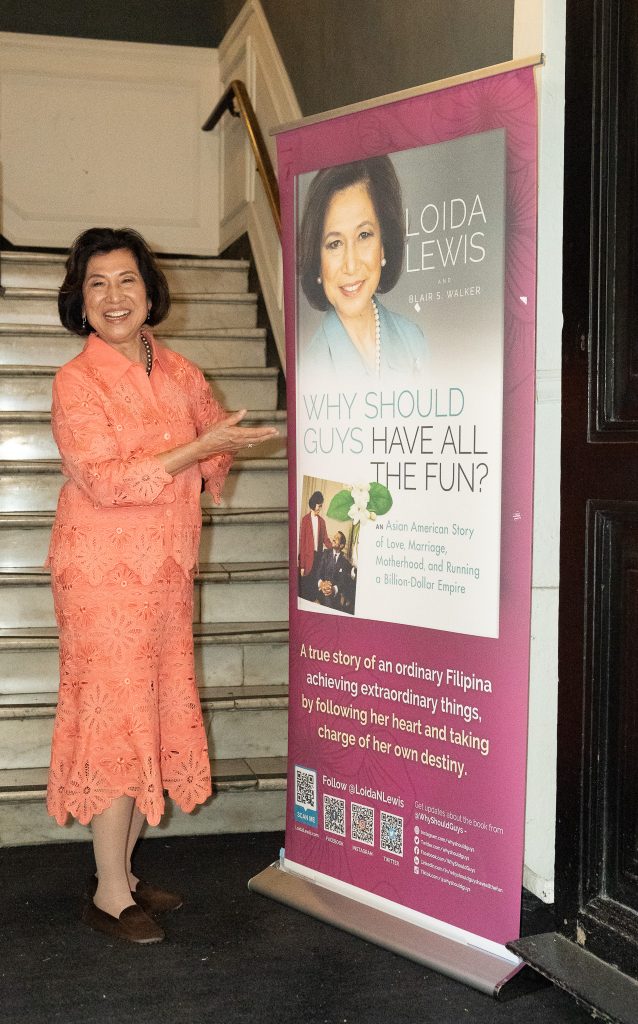
Loida´s book also highlights Asian-Americans. Given the rise in violence and hate against Asians, fueled by derogatory terms like “Kung-flu” during the pandemic, she aims to show that Asian-Americans experience the same highs, lows, sacrifices, and challenges as anyone else. Loida wants her readers to understand that they are just like any other Americans.
Challenging expectations
Loida has always been fearless and gritty, unafraid to challenge expectations. The first time I heard of her name was during the height of former president Rodrigo Duterte´s war on drugs in the Philippines, at a time when many were too afraid to voice their opposition. She was among the few who courageously spoke out against the extrajudicial killings that haunted the nation.
In the 70s, she bravely published a US-based magazine Ningas Cogon condemning the atrocities of Ferdinand Marcos Sr. “I really wonder whether corruption is so engrained in the society that it cannot be uprooted as it is tolerated. It has become a way of life.” In the 2000s, She also advocated for dual citizenship and voting for all Filipinos living outside the Philippines.
Loida reveals that the reason why she goes around Europe and gets in touch with Filipinos is because she wants to show that we Filipinos can do anything.
We are seen as quiet and not assertive. But in reality, we are known for being hardworking, loyal, and compassionate.
Loida Lewis
“A Filipina migrant ensures that her remittances are used wisely, such as supporting her children’s education or her family’s well-being, rather than spending on unnecessary gadgets. Simply sending money without oversight can be a sign of misplaced priorities and lack of common sense. It’s about thinking critically and not just following others’ desires. As what my mama used to say: dapat derecho ang utak.”
She then cites the dedication Filipino nurses had shown during the COVID pandemic. “Out of the 800,000 registered nurses in the U.S., Filipinos make up only 15%, yet 40% of those who died were Filipino nurses. We may not always voice our struggles, we don’t always complain but that does not mean we are submissive. We left our home country and have thrived in a new environment. I had never run a company but I took on the challenge. You know, when the opportunity comes, take it.”
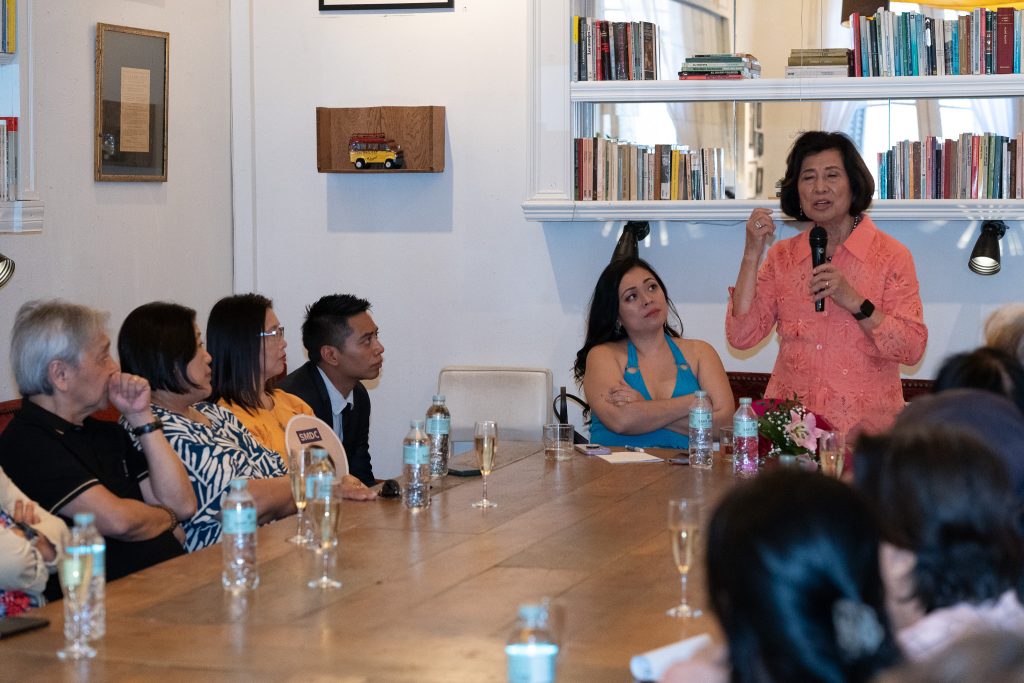
GOD to success
Loida emphasizes Goal Setting, Obedience to the Codes of Ethics and Determination as the main ingredients of success. “When you add the three together, they form G.O.D., with God’s guidance, anything is possible. During the darkest period of my life, after Mr. Lewis passed away, I was a basket case, but I clung to my faith, believing that God wouldn’t abandon me. And He didn´t.”
Loida is currently chair of the Reginald Lewis Foundation and the US-Filipinos for Good Governance. She has also been actively supporting numerous civic, cultural, academic and social organizations in the US and the Philippines including The Lewis College in her hometown Sorsogon. Aside from promoting her book, she enjoys her time getting busy with her The Loida Lewis Podcast.
“A woman can have it all, but not simultaneously. Women often manage their roles differently from men. We don’t need to adopt male behaviors or language to be effective. Empowerment comes from embracing our unique strengths and working in ways that align with our values and circumstances.”
Why should guys have all the fun? can be ordered online. For more information, visit www.loidalewis.com.
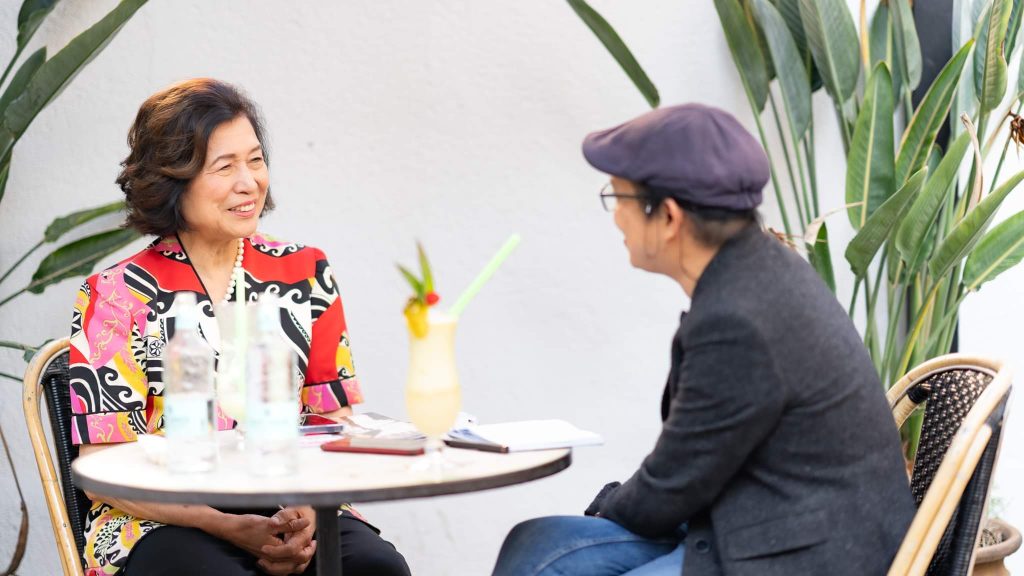
What's Your Reaction?
Nats Sisma Villaluna has been serving the Filipino community in Spain for more than 17 years. His volunteer works include teaching Spanish to Filipinos, and as artistic director of the Coro Kudyapi, a group of musically inclined young Filipinos in Barcelona. His passion to serve the Filipino community now extends to other countries in his role as Publisher and Editor-in-Chief of the new The Filipino Expat Magazine.




